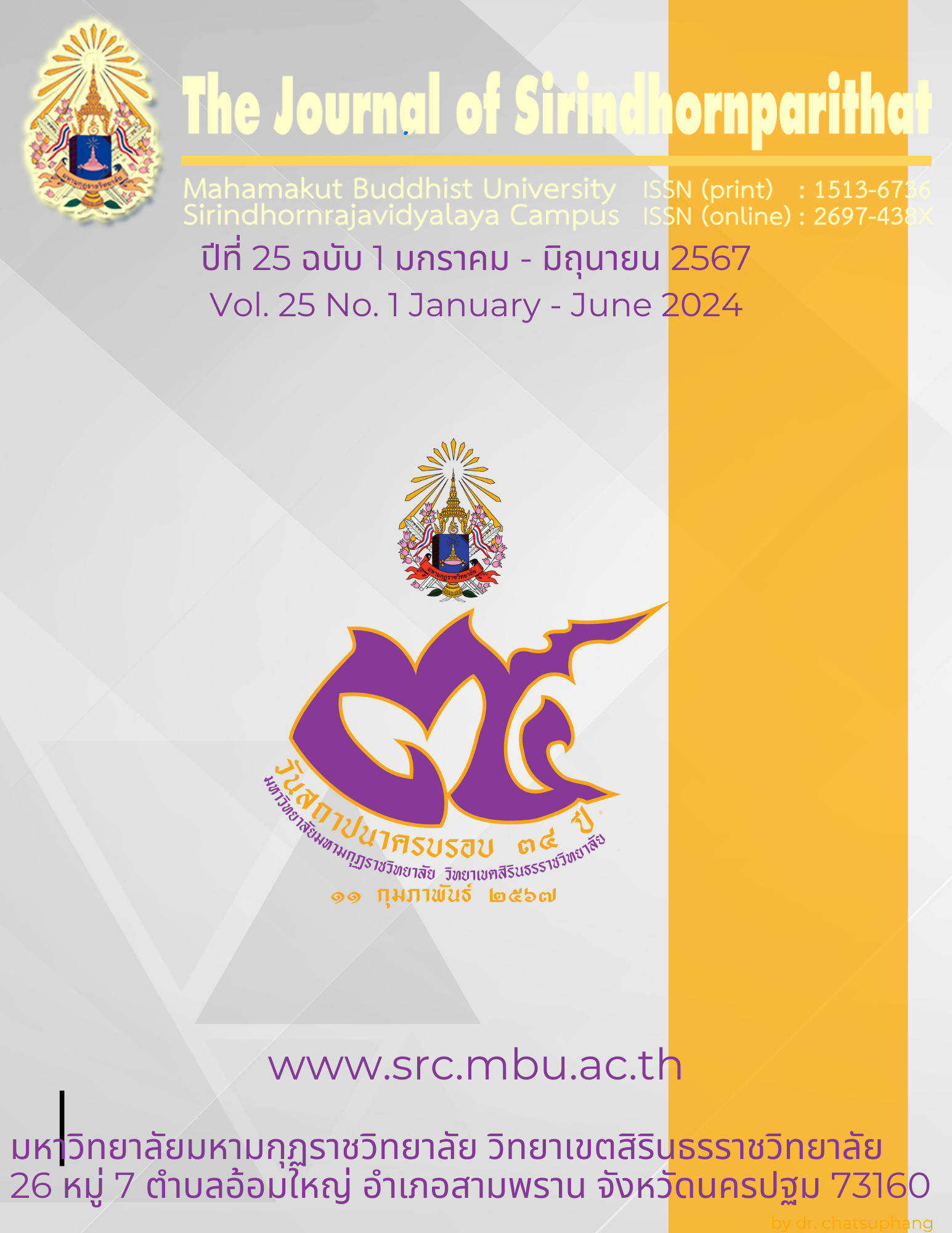The Practice of Mindfulness Meditation with Dhamma gīta for Mental Well-Being: A Case Study of Working Women Practitioners at Buddhamahametta Foundation, Chiang Rak Noi, Phra Nakhon Si Ayutthaya
Keywords:
Mindfulness Meditation, Dhamma Gīta, Mental Well-BeingAbstract
This study investigated how mindfulness meditation with Dhamma gīta affected mental well-being. The study was conducted with thirty-two working women practitioners at Buddhamahametta Foundation, Chiang Rak Noi, Phra Nakhon Si Ayutthaya. A mixed methodology was used in this research study. A quantitative method utilizing a paired-samples t-test was conducted to compare the mental well-being scores before and after the practice of mindfulness meditation with Dhamma gīta. The results revealed that there was a significant difference between the mental well-being scores before (M= 39.97, SD=9.51) and after the practice of mindfulness meditation with Dhamma gīta (M=52.91, SD=4.41), t (31) =-9.16, p < .001. Moreover, qualitative data explained that the practice helped increase the levels of mental well-being. From this research results, mindfulness meditation with Dhamma gīta could be an alternative method for working women practitioners.
References
Berghoff, C. R., Wheeless, L. E., Ritzert, T. R., Wooley, C. M., & Forsyth, J. P. (2017). Mindfulness meditation adherence in a college sample: Comparison of a 10-min versus 20-min 2-week daily practice. Mindfulness, 8(6) : 1513–1521.
Braun, V., & Clarke, V. (2012). Thematic analysis. In H. Cooper, P. M. Camic, D. L. Long, A. T. Panter, D. Rindskopf, & K. J. Sher (Eds.), APA handbook of research methods in psychology, Vol. 2. Research designs: Quantitative, qualitative, neuropsychological, and biological.
Chen, Y., Yang, X., Wang, L., & Zhang, X. (2013). A randomized controlled trial of the effects of brief mindfulness meditation on anxiety symptoms and systolic blood pressure in Chinese nursing students. Nurse Education Today, 33 : 1166-1172.
Hosseini, E. & Hosseini, S. (2019). Therapeutic Effects of Music: A Review, Report of Health Care Review Article, 4 : 1–13.
Goyal et al. (2014). Meditation programs for psychological stress and well-being: a systematic review and meta-analysis. JAMA internal medicine. 174(3) : 357-368.
Kacem I., Kahloul M., El Arem S., Ayachi S., Hafsia M., Maoua M., et al. (2020). Effects of music therapy on occupational stress and burn-out risk of operating room staff. The Libyan journal of medicine. 15(1) : 1-8.
Kroska, E., Miller, M., Roche, A., Kroska, S., & O’hara, M. (2018). Effects of traumatic experiences on obsessive-compulsive and internalizing symptoms: The role of avoidance and mindfulness. Journal of Affective Disorders. 225 : 326–336. https://doi.org/10.1016/j.jad.2017.08.039
Latifah, L., Budiyanto, A. & Puspita, M. (2015). The Role of Children Buddhist Songs in Cultivating Moral Values in Buddhist Sunday School. Proceeding Paper.
Lindsay, E. K., Chin, B., Greco, C. M., Young, S., Brown, K. W., Wright, A. G. C., Smyth, J. M., Burkett, D., & Creswell, J. D. (2018). How mindfulness training promotes positive emotions: Dismantling acceptance skills training in two randomized controlled trials. Journal of Personality and Social Psychology. 115(6) : 944–973. doi:https://doi.org/10.1037/pspa0000134
Maxwell, L., & Duff, E. (2016). Mindfulness: An Effective Prescription for Depression and Anxiety. The Journal for Nurse Practitioners. 12(6) : 403-409. doi:https://doi.org/10.1016/j.nurpra.2016.02.009
Morais, P., Quaresma, C., Vigário, R. & Quintão, C. (2021). Electrophysiological effects of mindfulness meditation in a concentration test. Med Biol Eng Comput. 59 : 759–773. doi:https://doi.org/10.1007/s11517-021-02332-y
Pimthong, S. et al. (2022). Development and Validation of the Thai Mental Well-Being Scale, Heliyon, 8(4) : 1-6.
Schwind, J. K., McCay, E., Beanlands, H., Schindel Martin, L., Martin, J., & Binder, M. (2017). Mindfulness practice as a teaching-learning strategy in higher education: A qualitative exploratory pilot study. Nurse Education Today. 50 : 92-96.
Song, Y., & Lindquist, R. (2015). Effects of mindfulness-based stress reduction on depression, anxiety, stress and mindfulness in Korean nursing students. Nurse Education Today. 35(1) : 86-90.
Speca, M., Carlson, L. E., Goodey, E., & Angen, M. (2000). A randomized, wait-list controlled clinical trial: The effect of a mindfulness meditation based stress reduction program on mood and symptoms of stress in cancer outpatients. Psychosomatic Medicine. 62 : 613-622.
WHO. (2001) Mental health: New understanding, new hope. The World Health Report. Geneva: World Health Organization.
Van der Riet, P., Rossiter, R., Kirby, D., Dluzewska, T., & Harmon, C. (2015). Piloting a stress management and mindfulness program for undergraduate nursing students: Student feedback and lessons learned. Nurse Education Today. 35(1) : 44-49. doi:https://doi.org/10.1016/j.nedt.2014.05.003

Downloads
Published
Issue
Section
License
Copyright (c) 2024 Mahamakut Buddhist University

This work is licensed under a Creative Commons Attribution-NonCommercial-NoDerivatives 4.0 International License.
บทความที่ได้รับการตีพิมพ์เป็นลิขสิทธิ์ของ มหาวิทยาลัยมหามกุฏราชวิทยาลัย วิทยาเขตสิรินธรราชวิทยาลัย
ข้อความที่ปรากฏในบทความแต่ละเรื่องในวารสารวิชาการเล่มนี้เป็นความคิดเห็นส่วนตัวของผู้เขียนแต่ละท่านไม่เกี่ยวข้องกับหาวิทยาลัยมหามกุฏราชวิทยาลัย วิทยาเขตสิรินธรราชวิทยาลัย และคณาจารย์ท่านอื่นๆในมหาวิทยาลัยฯ แต่อย่างใด ความรับผิดชอบองค์ประกอบทั้งหมดของบทความแต่ละเรื่องเป็นของผู้เขียนแต่ละท่าน หากมีความผิดพลาดใดๆ ผู้เขียนแต่ละท่านจะรับผิดชอบบทความของตนเองแต่ผู้เดียว



